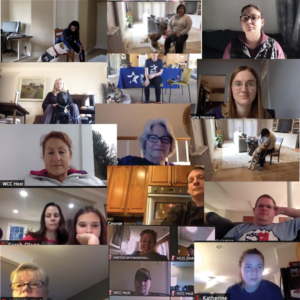Virtual Classes New Norm for WCC
 Over the past couple of weeks, thousands of schools, universities and other organizations have transitioned to online meetings and learning, and Warrior Canine Connection is no exception. Due to COVID-19 concerns, WCC recently moved its focus to support Veterans by using new virtual formats.
Over the past couple of weeks, thousands of schools, universities and other organizations have transitioned to online meetings and learning, and Warrior Canine Connection is no exception. Due to COVID-19 concerns, WCC recently moved its focus to support Veterans by using new virtual formats.
Veterans whose Mission Based Trauma Recovery (MBTR) programming was interrupted by the current global crisis are receiving weekly emails from WCC with resources and instructional videos. The content focuses on training skills, canine behavior and theories of learning, and other foundational training techniques.
Warrior Canine Connection is hopeful that the virtual social engagement, content and consistency of programming will allow Veteran participants to make even greater contributions to the dogs’ advancement, as well as their own personal progress. Right now, the goal is to keep as many Warriors involved in MBTR programming as possible to ensure they have the critically important Warrior Canine “Connections” that research shows reduce stress and isolation.
“This is a new design for all of us at WCC, so we’re learning as we go in an attempt to serve our Veterans, and ensure they continue seeing the benefits of MBTR, albeit virtually,” said Emily McNeal. “The challenge is a fun one as we work to create new content and educational pieces!”
And so far, it’s working well.
In addition to the Veterans and Service Members, it’s also crucial to keep the service dogs in training on regular training schedules. Those currently in the training pipeline and participating in MBTR will go on to be placed with Service Members and Veterans with visible and invisible wounds, once it’s responsible to do so.
Puppy Parents, volunteers who raise WCC’s service dogs in training for up to two years, also have new online programming dedicated to helping them keep future service dogs on-track. Although they typically come to WCC’s program sites once a week for classes, they’re now logging on to their computers and phones to take a class. So far, puppy parents in Boyds, Maryland; Denver, Colorado; Menlo Park, California and Asheville, North Carolina are participating in the online classes.
Service Dog Training Program Manager Kevin Simpson, who leads WCC’s service dog training program, says, “The ability to continue with group classes is helping restore a sense of normalcy for us all — if even only a little bit. And although face-to-face training is preferred, it is nice to see the teams working together in their home environments, too. Everyone appears relaxed with the online support and the training instructors are still able to provide immediate feedback as the puppy parents practice skills — it’s working.”
In these extraordinary times, we’re fortunate to have not only have each other but also extraordinary technology to help see us through.


